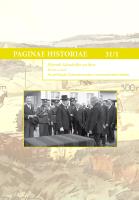Československo a krize rakouské demokracie (1932–1934). Nástin problematiky
Czechoslovakia and the Austrian Democracy Crisis (1932–1934): A Brief Outline of the Issue
Author(s): Miroslav ŠeptákSubject(s): History, Political history, Interwar Period (1920 - 1939)
Published by: Národní archiv
Keywords: Czechoslovak-Austrian relations; political crisis; Austrian politicians
Summary/Abstract: Although previous research of Czechoslovak-Austrian relations brought remarkable results, the Czechoslovak perspective on the democracy crisis in Austria during the 1930s was almost ignored. This study adumbrates two possible viewpoints on the given issue: from the perspective of unpublished sources of diplomatic provenance and through newspapers. Selected Czechoslovak periodicals monitored the internal development in Austria more or less intensely. Save for the Prager Presse daily, they interpreted the events through the party’s lens. The official Czechoslovak posts approached the events in Austria analytically, not expressing their preferences for the big coalition. They were aware of the confrontation style of the local politicians and factual absence of a permanent dialogue between the centre-right government and the social democratic opposition. The Czechoslovak embassy in Vienna provided them with first-hand information about the particular nuances of the Austrian internal politics. They monitored in detail the undemocratic development in the Alpine state, initiated by the government of Engelbert Dollfuss in the spring of 1933; however, they refused to interfere, both directly and indirectly, because they respected the rule of non-intervention in the interior affairs of a sovereign state and were rightfully concerned about the possible complications it might have brought about. Zdeněk Fierlinger, an openly left-minded diplomat in Vienna, had a different opinion and repeatedly recommended that the Prague headquarters use certain methods to provide help to social democrats. By influencing the Austrian administration, Prague rightfully sought a guarantee of return to pluralism. The Czechoslovak embassy in Vienna secretly supported the February rebels, in spite of different instructions from Edvard Beneš. Zdeněk Fierlinger was instrumental in organising the escape of a social democratic leader Oto Bauer to Czechoslovakia. Yet, quite understandably, he could not prevent the changing internal situation. Prague had to take into account another transition of the neighbouring state from democracy to authoritarianism. Apart from the internal aspects, the pressure from fascist Italy and Nazi Germany contributed to this transition in combination with the wariness and passivity of France and Great Britain.
Journal: Paginae Historiae
- Issue Year: 31/2023
- Issue No: 1
- Page Range: 312-324
- Page Count: 13
- Language: Czech

